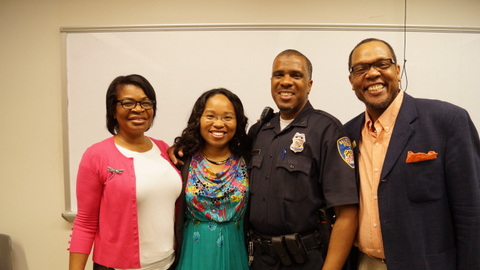
Shyrce Hall (left), Lynn Twyman, Program Administrator for the Baltimore Police Community Collaboration’s reentry and youth programs; Officer Robert Horne, Coordinator for the Baltimore Police Community Collaborative Division’s Reentry Program, gave a presentation on community policing to Col. Edward Jackson’s (BPD retiree) criminology class at Baltimore City Community College.
Shryce Hall was an active participant in the unrest that erupted in Baltimore’s streets last April. Why?
“Just to go against the police,” she said, revealing a photo of her screaming at a patiently poised officer and waving a wad of cash in the camera. The death of Freddie Gray brought back memories of Hall’s own negative experiences with police officers in the past.
Why the cash? She was prepared to be arrested, because she knew what she was doing was wrong. But her ill feelings toward the police defeated her conscience.
“It was my bail money,” the 51-year-old mother of two told the AFRO.
Looking back, Hall is not proud of her behavior that day. She then believed that the police only came around to make arrests. Today, she has a different perspective, especially since she now calls a policeman her friend.
“I had no respect for the police until I met Officer Horne,” said Hall. The two crossed paths at the Baltimore City Detention Center (BCDC), where she was a detainee, preparing to transition back into the community. Officer Robert Horne was there to help her. As reentry coordinator for the BPD’s Reentry Program, his job is to assist returning citizens with accessing the resources they need to meet with success on the outside.
The Reentry program is one of four community outreach initiatives established by the Community Collaboration Division (CCD) of the Baltimore City Police Department (BPD). The purpose of the program is for the BPD to collaborate with community and faith-based organizations to deliver evidence-based transitional services behind the wall as well as accountability and services beyond prison walls.
One of the services provided is ELEVATION, a 12-week life skills training program that “teaches men and women detainees to set personal goals and be accountable for life choices.” Officer Horne is among four officers assigned to facilitate group sessions in collaboration with workers of Baltimore’s Safe and Sound Campaign, a movement launched in 1996 to improve the lives of children, youth, and families. Classes address anger management, drug education, parenting, relationships and spiritual growth. The spiritual aspect of rehabilitation is critical to transition, said Horne, who has volunteered with the Department of Corrections as chaplain for the Muslim population for 18 years.
The CCD has also established partnerships with the Center for Urban Youth and Families’ STRIVE program to provide workforce readiness and retention services and Baltimore Cares, an organization that provides treatment for mental illness and substance abuse disorders.
When Hall was released two months ago, a team of reentry officers showed up to assist with the transition. She had no food, no money, and an overdue electric bill. These are among some of the barriers people face when reentering the community following incarceration. Unaddressed and exacerbated mental health issues, housing, and unemployment are others. But because of her participation in the reentry program, most of those barriers were removed.
“I heard about what they do while I was in the detention center, but I actually experienced it once I got home,” said Hall. “I was dazed and confused; I called them as soon as I was released and they were there. I was taken care of. I don’t know what would have happened if I didn’t have their support.”
Success stories have created a buzz among inmates at other correctional facilities and are advocating for the expansion of the program. Out in the community, however, tensions are high and trust is low between the police and the people.
Horne said he believes the media continues to fuel the public’s fear and mistrust of law enforcement. “There’s more to policing than writing tickets and locking people up. Unfortunately, people get their information from the te‘lie’vision, and the media will take every opportunity to dehumanize the police. There are many of us out here working to win the heart of the community. It makes our job easier and reduces recidivism,” he said.

